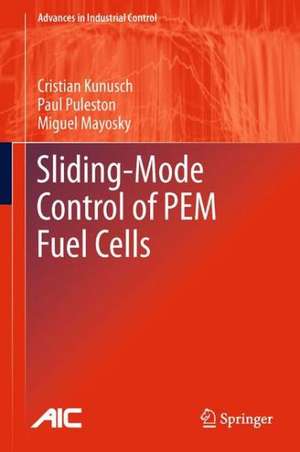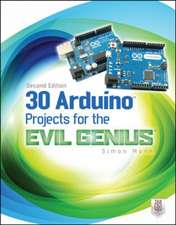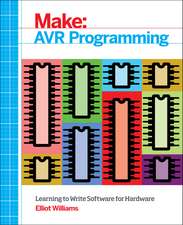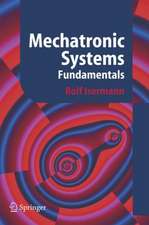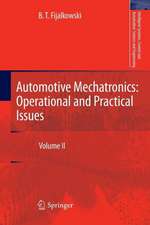Sliding-Mode Control of PEM Fuel Cells: Advances in Industrial Control
Autor Cristian Kunusch, Paul Puleston, Miguel Mayoskyen Limba Engleză Paperback – 22 feb 2014
The book introduces the theory of fuel cells and sliding-mode control. It contextualises PEMFCs both in terms of their development and within the hydrogen economy and today’s energy production situation as a whole. It then discusses fuel-cell operation principles, the mathematical background of high-order sliding-mode control and to a feasibility study for the use of sliding modes in the control of an automotive fuel stack.
Part II presents experimental results of sliding-mode-control application to laboratory fuel cells and deals with subsystem-based modelling, detailed design, and observability and controllability. Simulation results are contrasted with empirical data and performance, robustness and implementation issues are treated in depth. Possibilities for future research are also laid out.
| Toate formatele și edițiile | Preț | Express |
|---|---|---|
| Paperback (1) | 635.96 lei 6-8 săpt. | |
| SPRINGER LONDON – 22 feb 2014 | 635.96 lei 6-8 săpt. | |
| Hardback (1) | 640.06 lei 6-8 săpt. | |
| SPRINGER LONDON – 15 ian 2012 | 640.06 lei 6-8 săpt. |
Din seria Advances in Industrial Control
- 15%
 Preț: 643.34 lei
Preț: 643.34 lei - 23%
 Preț: 582.63 lei
Preț: 582.63 lei - 18%
 Preț: 783.98 lei
Preț: 783.98 lei - 18%
 Preț: 947.35 lei
Preț: 947.35 lei - 20%
 Preț: 568.24 lei
Preț: 568.24 lei - 15%
 Preț: 643.16 lei
Preț: 643.16 lei - 18%
 Preț: 899.21 lei
Preț: 899.21 lei - 18%
 Preț: 891.33 lei
Preț: 891.33 lei - 18%
 Preț: 740.57 lei
Preț: 740.57 lei - 18%
 Preț: 961.23 lei
Preț: 961.23 lei - 18%
 Preț: 955.08 lei
Preț: 955.08 lei - 15%
 Preț: 645.28 lei
Preț: 645.28 lei - 15%
 Preț: 638.43 lei
Preț: 638.43 lei - 18%
 Preț: 901.11 lei
Preț: 901.11 lei - 18%
 Preț: 1410.94 lei
Preț: 1410.94 lei - 18%
 Preț: 728.91 lei
Preț: 728.91 lei - 20%
 Preț: 1003.77 lei
Preț: 1003.77 lei - 18%
 Preț: 947.35 lei
Preț: 947.35 lei - 15%
 Preț: 643.34 lei
Preț: 643.34 lei - 15%
 Preț: 654.30 lei
Preț: 654.30 lei - 18%
 Preț: 950.52 lei
Preț: 950.52 lei - 15%
 Preț: 644.30 lei
Preț: 644.30 lei - 18%
 Preț: 1393.09 lei
Preț: 1393.09 lei - 18%
 Preț: 950.21 lei
Preț: 950.21 lei - 18%
 Preț: 949.90 lei
Preț: 949.90 lei - 18%
 Preț: 949.42 lei
Preț: 949.42 lei - 18%
 Preț: 950.52 lei
Preț: 950.52 lei - 18%
 Preț: 1113.71 lei
Preț: 1113.71 lei - 15%
 Preț: 650.04 lei
Preț: 650.04 lei - 15%
 Preț: 644.95 lei
Preț: 644.95 lei - 18%
 Preț: 950.33 lei
Preț: 950.33 lei - 18%
 Preț: 948.61 lei
Preț: 948.61 lei - 18%
 Preț: 1112.60 lei
Preț: 1112.60 lei - 15%
 Preț: 644.63 lei
Preț: 644.63 lei - 18%
 Preț: 953.20 lei
Preț: 953.20 lei - 18%
 Preț: 945.62 lei
Preț: 945.62 lei - 15%
 Preț: 640.88 lei
Preț: 640.88 lei - 15%
 Preț: 640.88 lei
Preț: 640.88 lei - 20%
 Preț: 650.92 lei
Preț: 650.92 lei - 18%
 Preț: 1112.60 lei
Preț: 1112.60 lei - 20%
 Preț: 998.36 lei
Preț: 998.36 lei - 15%
 Preț: 643.34 lei
Preț: 643.34 lei - 18%
 Preț: 948.92 lei
Preț: 948.92 lei - 18%
 Preț: 1381.43 lei
Preț: 1381.43 lei - 15%
 Preț: 651.51 lei
Preț: 651.51 lei - 15%
 Preț: 647.08 lei
Preț: 647.08 lei - 20%
 Preț: 563.66 lei
Preț: 563.66 lei - 18%
 Preț: 998.03 lei
Preț: 998.03 lei - 18%
 Preț: 1225.79 lei
Preț: 1225.79 lei
Preț: 635.96 lei
Preț vechi: 748.20 lei
-15% Nou
Puncte Express: 954
Preț estimativ în valută:
121.70€ • 126.34$ • 101.48£
121.70€ • 126.34$ • 101.48£
Carte tipărită la comandă
Livrare economică 22 martie-05 aprilie
Preluare comenzi: 021 569.72.76
Specificații
ISBN-13: 9781447160434
ISBN-10: 1447160436
Pagini: 200
Ilustrații: XX, 180 p.
Dimensiuni: 155 x 235 x 11 mm
Greutate: 0.3 kg
Ediția:2012
Editura: SPRINGER LONDON
Colecția Springer
Seria Advances in Industrial Control
Locul publicării:London, United Kingdom
ISBN-10: 1447160436
Pagini: 200
Ilustrații: XX, 180 p.
Dimensiuni: 155 x 235 x 11 mm
Greutate: 0.3 kg
Ediția:2012
Editura: SPRINGER LONDON
Colecția Springer
Seria Advances in Industrial Control
Locul publicării:London, United Kingdom
Public țintă
ResearchCuprins
Introducing Fuel Cells.- Basics of PEM Fuel Cells.- Fundamentals of Sliding Mode Control Design.- Assessment of SOSM Techniques Applied to Fuel Cell Control.- Control-oriented Modelling and Experimental Validation of a PEMFC Generation System.- SOSM Controller for the PEMFC Generation System: Design and Implementation.- Closing Remarks.
Notă biografică
The authors have a working career on automatic control reseach, mostly in the academic arena, with a significant number of peer-reviewed international papers on prestigious jounals and international meetings. This book is the result of theoretical reseach and experimental development activities on non-linear control of the fuel cell area during the last five years. It presents working models of real PEM fuel cell arrangements and experimental results of the control techniques proposed.
Textul de pe ultima copertă
Recent advances in catalysis technologies and new materials make fuel cells an economically appealing and clean energy source with massive market potential in portable devices, home power generation and the automotive industry. Among the more promising fuel-cell technologies are proton exchange membrane fuel cells (PEMFCs).
Sliding-Mode Control of PEM Fuel Cells demonstrates the application of higher-order sliding-mode control to PEMFC dynamics. Fuel-cell dynamics are often highly nonlinear and the text shows the advantages of sliding modes in terms of robustness to external disturbance, modelling error and system-parametric disturbance using higher-order control to reduce chattering.
Divided into two parts, the book first introduces the theory of fuel cells and sliding-mode control. It begins by contextualising PEMFCs both in terms of their development and within the hydrogen economy and today’s energy production situation as a whole. The reader is then guided through a discussion of fuel-cell operation principles, the mathematical background of high-order sliding-mode control and to a feasibility study for the use of sliding modes in the control of an automotive fuel stack.
Part II presents experimental results of sliding-mode-control application to a laboratory fuel cell and deals with subsystem-based modeling and detailed controller design. Simulation results are contrasted with empirical data and performance, robustness and implementation issues are treated in depth. Possibilities for future research are also laid out.
The state-of-the-art research in nonlinear control of fuel cells presented in this volume will be of interest to academics and graduate students working in nonlinear control and sliding modes, particularly those studying fuel-cell systems. Control engineers and designers working with fuel-cell technology in industrial environments can also find new ideas and inspiration from reading Sliding-modeControl of PEM Fuel Cells.
Advances in Industrial Control aims to report and encourage the transfer of technology in control engineering. The rapid development of control technology has an impact on all areas of the control discipline. The series offers an opportunity for researchers to present an extended exposition of new work in all aspects of industrial control.
Sliding-Mode Control of PEM Fuel Cells demonstrates the application of higher-order sliding-mode control to PEMFC dynamics. Fuel-cell dynamics are often highly nonlinear and the text shows the advantages of sliding modes in terms of robustness to external disturbance, modelling error and system-parametric disturbance using higher-order control to reduce chattering.
Divided into two parts, the book first introduces the theory of fuel cells and sliding-mode control. It begins by contextualising PEMFCs both in terms of their development and within the hydrogen economy and today’s energy production situation as a whole. The reader is then guided through a discussion of fuel-cell operation principles, the mathematical background of high-order sliding-mode control and to a feasibility study for the use of sliding modes in the control of an automotive fuel stack.
Part II presents experimental results of sliding-mode-control application to a laboratory fuel cell and deals with subsystem-based modeling and detailed controller design. Simulation results are contrasted with empirical data and performance, robustness and implementation issues are treated in depth. Possibilities for future research are also laid out.
The state-of-the-art research in nonlinear control of fuel cells presented in this volume will be of interest to academics and graduate students working in nonlinear control and sliding modes, particularly those studying fuel-cell systems. Control engineers and designers working with fuel-cell technology in industrial environments can also find new ideas and inspiration from reading Sliding-modeControl of PEM Fuel Cells.
Advances in Industrial Control aims to report and encourage the transfer of technology in control engineering. The rapid development of control technology has an impact on all areas of the control discipline. The series offers an opportunity for researchers to present an extended exposition of new work in all aspects of industrial control.
Caracteristici
Shows the reader how to deal with problems associated with nonlinear behaviour in fuel-cell systems Assists the reader in reaching environmental goals by making fuel cells a more practical approach to energy generation Includes supplementary material: sn.pub/extras
